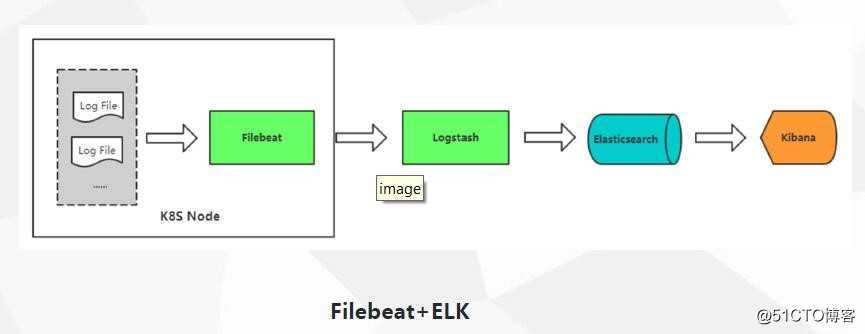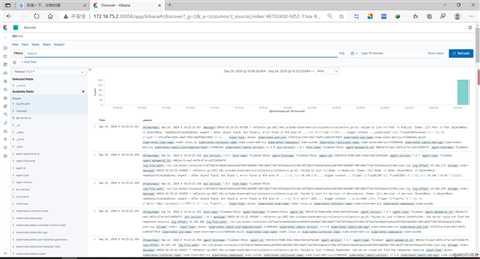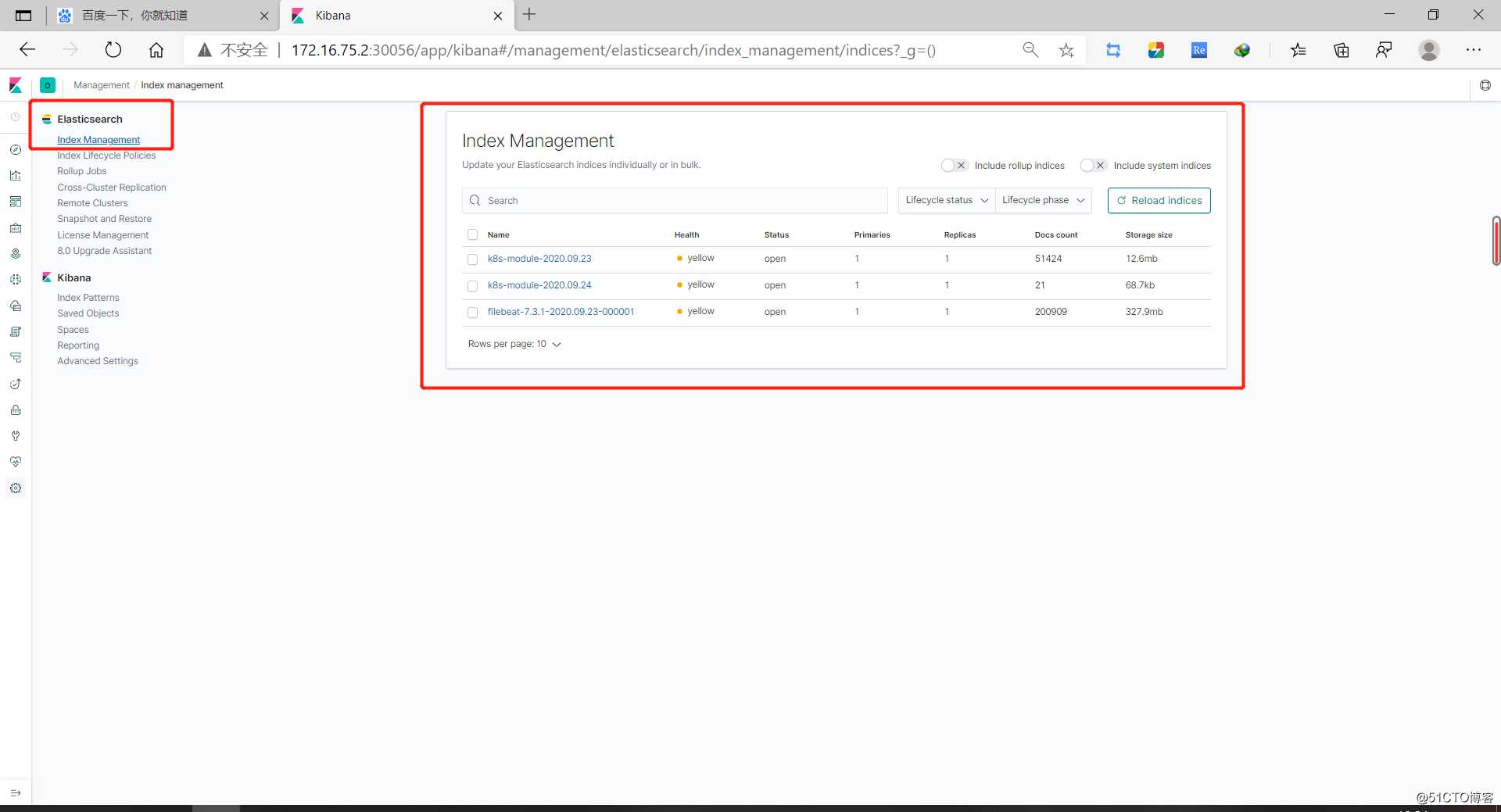使用版本
ELK = Elasticsearch(ES) + Logstash(Filebeat) + Kibana
Elasticsearch:是一个开源的分布式搜索引擎,提供搜集、分析、存储数据的功能,在ELK主要是把日志索引存储起来,方便检索。
Logstash:是一个日志的收集工具,但因为其消耗资源较大,我们在 k8s 集群中采用的是 Filebeat 轻量级收集工具,经过日志收集,分析以后,发送到 Elasticsearch 中存储起来。
kibana:作为一个界面展示工具,将 Elasticsearch 中存储的日志进行界面展示,方便我们查看和进行分析。
k8s 中使用的 ELK 的日志方案:

通过Filebeat把日志进行收集过滤,然后发送到 Elasticsearch 中进行存储,Kibana 进行效果展示。
官方介绍文档:
https://www.elastic.co/guide/index.html
elasticsearch.yaml kibana.yaml filebeat.yaml
[root@master fek]# for i in `ls ./*`; do ls -l $i && cat $i; done
-rw-r--r-- 1 root root 1386 9月 4 2019 ./elasticsearch.yaml
apiVersion: apps/v1
kind: StatefulSet
metadata:
name: elasticsearch
namespace: kube-system
labels:
k8s-app: elasticsearch
spec:
serviceName: elasticsearch
selector:
matchLabels:
k8s-app: elasticsearch
template:
metadata:
labels:
k8s-app: elasticsearch
spec:
containers:
- image: elasticsearch:7.3.1
name: elasticsearch
resources:
limits:
cpu: 1
memory: 2Gi
requests:
cpu: 0.5
memory: 500Mi
env:
- name: "discovery.type"
value: "single-node"
- name: ES_JAVA_OPTS
value: "-Xms512m -Xmx2g"
ports:
- containerPort: 9200
name: db
protocol: TCP
volumeMounts:
- name: elasticsearch-data
mountPath: /usr/share/elasticsearch/data
volumeClaimTemplates:
- metadata:
name: elasticsearch-data
spec:
storageClassName: "managed-nfs-storage"
accessModes: [ "ReadWriteOnce" ]
resources:
requests:
storage: 20Gi
---
apiVersion: v1
kind: Service
metadata:
name: elasticsearch
namespace: kube-system
spec:
clusterIP: None
ports:
- port: 9200
protocol: TCP
targetPort: db
selector:
k8s-app: elasticsearch
-rw-r--r-- 1 root root 3611 9月 23 11:21 ./filebeat-kubernetes.yaml
---
apiVersion: v1
kind: ConfigMap
metadata:
name: filebeat-config
namespace: kube-system
labels:
k8s-app: filebeat
data:
filebeat.yml: |-
filebeat.config:
inputs:
# Mounted `filebeat-inputs` configmap:
path: ${path.config}/inputs.d/*.yml
# Reload inputs configs as they change:
reload.enabled: false
modules:
path: ${path.config}/modules.d/*.yml
# Reload module configs as they change:
reload.enabled: false
# To enable hints based autodiscover, remove `filebeat.config.inputs` configuration and uncomment this:
#filebeat.autodiscover:
# providers:
# - type: kubernetes
# hints.enabled: true
output.elasticsearch:
hosts: [‘${ELASTICSEARCH_HOST:elasticsearch}:${ELASTICSEARCH_PORT:9200}‘]
---
apiVersion: v1
kind: ConfigMap
metadata:
name: filebeat-inputs
namespace: kube-system
labels:
k8s-app: filebeat
data:
kubernetes.yml: |-
- type: docker
containers.ids:
- "*"
processors:
- add_kubernetes_metadata:
in_cluster: true
---
apiVersion: apps/v1
kind: DaemonSet
metadata:
name: filebeat
namespace: kube-system
labels:
k8s-app: filebeat
spec:
selector:
matchLabels:
k8s-app: filebeat
template:
metadata:
labels:
k8s-app: filebeat
spec:
serviceAccountName: filebeat
terminationGracePeriodSeconds: 30
containers:
- name: filebeat
image: elastic/filebeat:7.3.1
args: [
"-c", "/etc/filebeat.yml",
"-e",
]
env:
- name: ELASTICSEARCH_HOST
value: elasticsearch
- name: ELASTICSEARCH_PORT
value: "9200"
securityContext:
runAsUser: 0
# If using Red Hat OpenShift uncomment this:
#privileged: true
resources:
limits:
memory: 200Mi
requests:
cpu: 100m
memory: 100Mi
volumeMounts:
- name: config
mountPath: /etc/filebeat.yml
readOnly: true
subPath: filebeat.yml
- name: inputs
mountPath: /usr/share/filebeat/inputs.d
readOnly: true
- name: data
mountPath: /usr/share/filebeat/data
- name: varlibdockercontainers
mountPath: /var/lib/docker/containers
readOnly: true
volumes:
- name: config
configMap:
defaultMode: 0600
name: filebeat-config
- name: varlibdockercontainers
hostPath:
path: /var/lib/docker/containers
- name: inputs
configMap:
defaultMode: 0600
name: filebeat-inputs
# data folder stores a registry of read status for all files, so we don‘t send everything again on a Filebeat pod restart
- name: data
hostPath:
path: /var/lib/filebeat-data
type: DirectoryOrCreate
---
apiVersion: rbac.authorization.k8s.io/v1beta1
kind: ClusterRoleBinding
metadata:
name: filebeat
subjects:
- kind: ServiceAccount
name: filebeat
namespace: kube-system
roleRef:
kind: ClusterRole
name: filebeat
apiGroup: rbac.authorization.k8s.io
---
apiVersion: rbac.authorization.k8s.io/v1beta1
kind: ClusterRole
metadata:
name: filebeat
labels:
k8s-app: filebeat
rules:
- apiGroups: [""] # "" indicates the core API group
resources:
- namespaces
- pods
verbs:
- get
- watch
- list
---
apiVersion: v1
kind: ServiceAccount
metadata:
name: filebeat
namespace: kube-system
labels:
k8s-app: filebeat
---
-rw-r--r-- 1 root root 882 9月 23 12:05 ./kibana.yaml
apiVersion: apps/v1
kind: Deployment
metadata:
name: kibana
namespace: kube-system
labels:
k8s-app: kibana
spec:
replicas: 1
selector:
matchLabels:
k8s-app: kibana
template:
metadata:
labels:
k8s-app: kibana
spec:
containers:
- name: kibana
image: kibana:7.3.1
resources:
limits:
cpu: 1
memory: 500Mi
requests:
cpu: 0.5
memory: 200Mi
env:
- name: ELASTICSEARCH_HOSTS
value: http://elasticsearch:9200
ports:
- containerPort: 5601
name: ui
protocol: TCP
---
apiVersion: v1
kind: Service
metadata:
name: kibana
namespace: kube-system
spec:
type: NodePort
ports:
- port: 5601
protocol: TCP
targetPort: ui
nodePort: 30056
selector:
k8s-app: kibana[root@master elk]# for i in `ls *.yaml`;do ls -l $i && cat $i; done
-rw-r--r-- 1 root root 1525 9月 23 10:38 k8s-logs.yaml
apiVersion: v1
kind: ConfigMap
metadata:
name: k8s-logs-filebeat-config
namespace: kube-system
data:
filebeat.yml: |
filebeat.inputs:
- type: log
paths:
- /var/log/messages
fields:
app: k8s
type: module
fields_under_root: true
setup.ilm.enabled: false
setup.template.name: "k8s-module"
setup.template.pattern: "k8s-module-*"
output.elasticsearch:
hosts: [‘elasticsearch.kube-system:9200‘]
index: "k8s-module-%{+yyyy.MM.dd}"
---
apiVersion: apps/v1
kind: DaemonSet
metadata:
name: k8s-logs
namespace: kube-system
spec:
selector:
matchLabels:
project: k8s
app: filebeat
template:
metadata:
labels:
project: k8s
app: filebeat
spec:
containers:
- name: filebeat
image: elastic/filebeat:7.3.1
args: [
"-c", "/etc/filebeat.yml",
"-e",
]
resources:
requests:
cpu: 100m
memory: 100Mi
limits:
cpu: 500m
memory: 500Mi
securityContext:
runAsUser: 0
volumeMounts:
- name: filebeat-config
mountPath: /etc/filebeat.yml
subPath: filebeat.yml
- name: k8s-logs
mountPath: /var/log/messages
volumes:
- name: k8s-logs
hostPath:
path: /var/log/messages
- name: filebeat-config
configMap:
name: k8s-logs-filebeat-config
-rw-r--r-- 1 root root 2288 9月 4 2019 nginx-deployment.yaml
apiVersion: apps/v1beta1
kind: Deployment
metadata:
name: php-demo
namespace: test
spec:
replicas: 3
selector:
matchLabels:
project: www
app: php-demo
template:
metadata:
labels:
project: www
app: php-demo
spec:
imagePullSecrets:
- name: registry-pull-secret
containers:
- name: nginx
image: lizhenliang/nginx-php
ports:
- containerPort: 80
name: web
protocol: TCP
resources:
requests:
cpu: 0.5
memory: 256Mi
limits:
cpu: 1
memory: 1Gi
livenessProbe:
httpGet:
path: /status.html
port: 80
initialDelaySeconds: 20
timeoutSeconds: 20
readinessProbe:
httpGet:
path: /status.html
port: 80
initialDelaySeconds: 20
timeoutSeconds: 20
volumeMounts:
- name: nginx-logs
mountPath: /usr/local/nginx/logs
- name: filebeat
image: elastic/filebeat:7.3.1
args: [
"-c", "/etc/filebeat.yml",
"-e",
]
resources:
limits:
memory: 500Mi
requests:
cpu: 100m
memory: 100Mi
securityContext:
runAsUser: 0
volumeMounts:
- name: filebeat-config
mountPath: /etc/filebeat.yml
subPath: filebeat.yml
- name: nginx-logs
mountPath: /usr/local/nginx/logs
volumes:
- name: nginx-logs
emptyDir: {}
- name: filebeat-config
configMap:
name: filebeat-nginx-config
---
apiVersion: v1
kind: ConfigMap
metadata:
name: filebeat-nginx-config
namespace: test
data:
filebeat.yml: |-
filebeat.inputs:
- type: log
paths:
- /usr/local/nginx/logs/access.log
# tags: ["access"]
fields:
app: www
type: nginx-access
fields_under_root: true
setup.ilm.enabled: false
setup.template.name: "nginx-access"
setup.template.pattern: "nginx-access-*"
output.elasticsearch:
hosts: [‘elasticsearch.kube-system:9200‘]
index: "nginx-access-%{+yyyy.MM.dd}"
-rw-r--r-- 1 root root 2406 9月 4 2019 tomcat-deployment.yaml
apiVersion: apps/v1beta1
kind: Deployment
metadata:
name: tomcat-java-demo
namespace: test
spec:
replicas: 3
selector:
matchLabels:
project: www
app: java-demo
template:
metadata:
labels:
project: www
app: java-demo
spec:
imagePullSecrets:
- name: registry-pull-secret
containers:
- name: tomcat
image: 192.168.31.61/project/tomcat-java-demo:latest
imagePullPolicy: Always
ports:
- containerPort: 8080
name: web
protocol: TCP
resources:
requests:
cpu: 0.5
memory: 1Gi
limits:
cpu: 1
memory: 2Gi
livenessProbe:
httpGet:
path: /
port: 8080
initialDelaySeconds: 60
timeoutSeconds: 20
readinessProbe:
httpGet:
path: /
port: 8080
initialDelaySeconds: 60
timeoutSeconds: 20
volumeMounts:
- name: tomcat-logs
mountPath: /usr/local/tomcat/logs
- name: filebeat
image: elastic/filebeat:7.3.1
args: [
"-c", "/etc/filebeat.yml",
"-e",
]
resources:
limits:
memory: 500Mi
requests:
cpu: 100m
memory: 100Mi
securityContext:
runAsUser: 0
volumeMounts:
- name: filebeat-config
mountPath: /etc/filebeat.yml
subPath: filebeat.yml
- name: tomcat-logs
mountPath: /usr/local/tomcat/logs
volumes:
- name: tomcat-logs
emptyDir: {}
- name: filebeat-config
configMap:
name: filebeat-config
---
apiVersion: v1
kind: ConfigMap
metadata:
name: filebeat-config
namespace: test
data:
filebeat.yml: |-
filebeat.inputs:
- type: log
paths:
- /usr/local/tomcat/logs/catalina.*
# tags: ["tomcat"]
fields:
app: www
type: tomcat-catalina
fields_under_root: true
multiline:
pattern: ‘^\[‘
negate: true
match: after
setup.ilm.enabled: false
setup.template.name: "tomcat-catalina"
setup.template.pattern: "tomcat-catalina-*"
output.elasticsearch:
hosts: [‘elasticsearch.kube-system:9200‘]
index: "tomcat-catalina-%{+yyyy.MM.dd}"


原文:https://blog.51cto.com/liujingyu/2537488